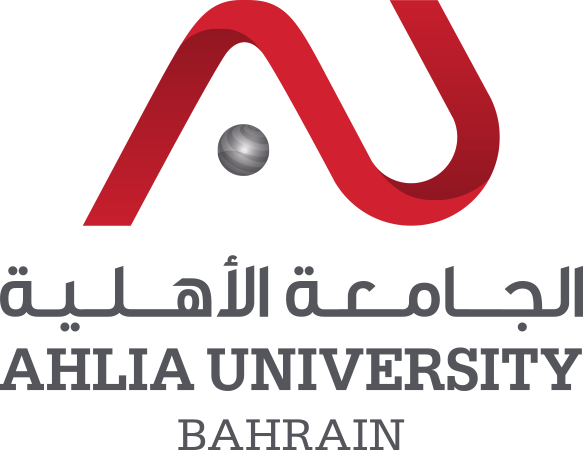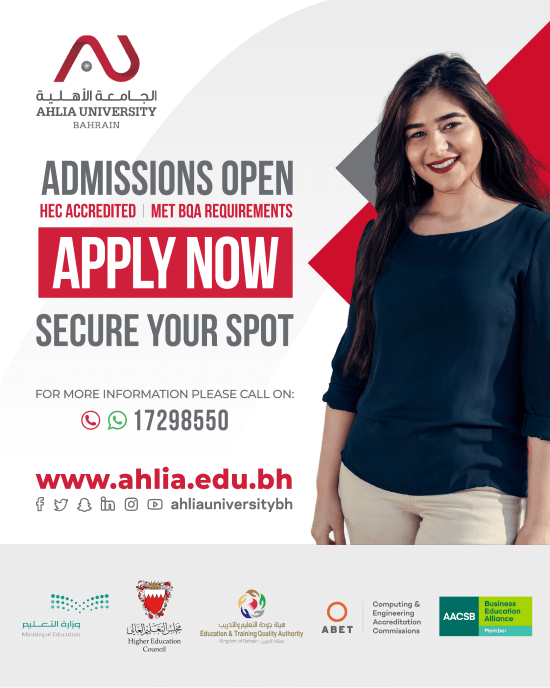Ahlia University
Sustainable Development Goals
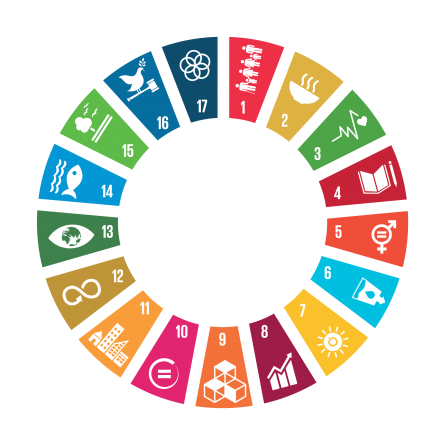
Useful Resources
United Nations developed 17 Sustainable Development Goals to protect the planet and ensure that all people enjoy peace and prosperity by 2030, Higher Education Institutions plays a vital role in promoting and achieving these Goals. In line with Ahlia University (AU) initiative to contribute towards United Nations Sustainable Development Goals (UNSDGs), AU considers Social Responsibility and Sustainability as part of its prioritized strategies that is embedded in its core functions including teaching, research and community. The University is committed to contribute and work towards UNSDGs through encouragement of research in various research areas such as quality education, equal opportunities and sustainable growth. In order to create a recognized impact AU promotes partnership with national and international organizations tackling UNSDGs.
AU has listed its commitment towards UNSGDs in UN Partnership Platform as leading Private Higher Education in Bahrain. (Click here)
SDGs commitment
AU developed Sustainable Development Plan (2021-2025), the plan is developed to reflect AU’s commitment towards UNSDGs and to contribute to National Strategies as well as International Standards.
This plan is committed to contribute to national strategies and Initiatives (2030) and create an impact at National, Regional and International Level for sustainable future for our next generations.
The plan is focused on SDGs as a priority, AU carefully selected the 7 SDGs with assurance of its relationships with national strategies and government directions, AU emphasis on Quality Education and providing a sustainable future for all and promotes UNSDGs to be part of its core functions, teaching and learning, research as well as community.
Integrating Education Sustainable Development (ESD) Skills within Academic Programmes:
Ahlia University academic programmes was revised with a consideration of Educational for Sustainable Development (ESD) Framework by UNESCO. AU aligned the ESD competencies with AU graduate attributes with a focus on key skills including (adaptability, personal resilience, connectivity, engagement, negotiation, global citizenship, research, ethics and innovation). The key skills are integrated within courses through specific intended learning outcomes related to knowledge, applied skills, critical thinking and general and transferable skills. The courses are carefully crafted with assurance of learning cascaded across 4 years of study, the learning outcomes are assessed through direct and in-direct assessments. The integration of UNSDGs within the curriculum enabled generating 217 published research studies with recommended conclusions to support the society and policy making.
Conducting Annual Conferences tackling UNSDGs
Ahlia University in collaboration with Brunel University of London and University of Business and Technology (KSA) is conducting the annual conference tackling Equal Opportunities in the fields of Business and Technology. The conference attracted 170 researchers from 27 different countries including GCC, UK, USA and Africa. The conference also attracts policy makers from regulatory authorities including the Supreme Council of Women to discuss vital topics related to women empowerment, gender equality etc. The outcome of the conference includes publishable research in Scopus indexed proceeding.
Voluntary Reporting of AU’s Commitment:
Ahlia University is committed to knowledge sharing therefore, AU reports annually the major achievements against UNSDGs and share it voluntary through United Nations Higher Education Sustainability Initiative (HESI) Platform. The platform includes progress tracking on the committed actions which includes integration of UNSDGs in the curriculum to support UNSDG4. For more information please see: UN HESI – Platform Commitment Ahlia University Sustainability Initiative | Department of Economic and Social Affairs
The 17 SDGs
 GOOD HEALTH AND WELL-BEING
GOOD HEALTH AND WELL-BEING
 Quality Education
Quality Education
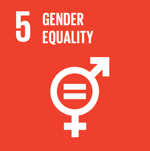 Gender Equality
Gender Equality
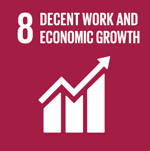 Decent Work and Economic Growth
Decent Work and Economic Growth
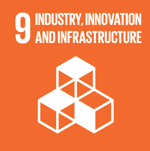 Industry, Innovation and Infrastructure
Industry, Innovation and Infrastructure
 Reduced Inequalities
Reduced Inequalities
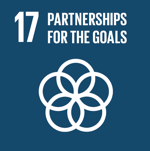 Partnership for the Goals
Partnership for the Goals
 GOOD HEALTH AND WELL-BEING
GOOD HEALTH AND WELL-BEING
Overview and Highlights:
Obtained a certification by World Health Organization (WHO) for being a Health University. Ahlia University has conducted 27 activities related to the Learners, Academic and Professional Staff Mental health, and well-being in various topics. A collaboration with societies at national, regional, and international level is achieved through:
- Licenced and fully equipped health clinic with qualified nurse, daily announcements and awareness sessions are disseminated to all stakeholders, free access to the health clinic to Ahlia University campus visitors.
- Learners conducted 59 research studies tackles healthcare management which includes innovative technology, women leadership in healthcare and other related fields to support Good Health and Well-being.
- Signing an agreement with the Bahrain Association for Parents & Friends of Disabled.
- Inviting guest speakers from Kingdom of Bahrain, Kuwait, and United Arab of Emirates to deliver lectures related to the well-being topics.
- During COVID19 established a call centre that is designated to handle Learners issues and provide instant support and guidance.
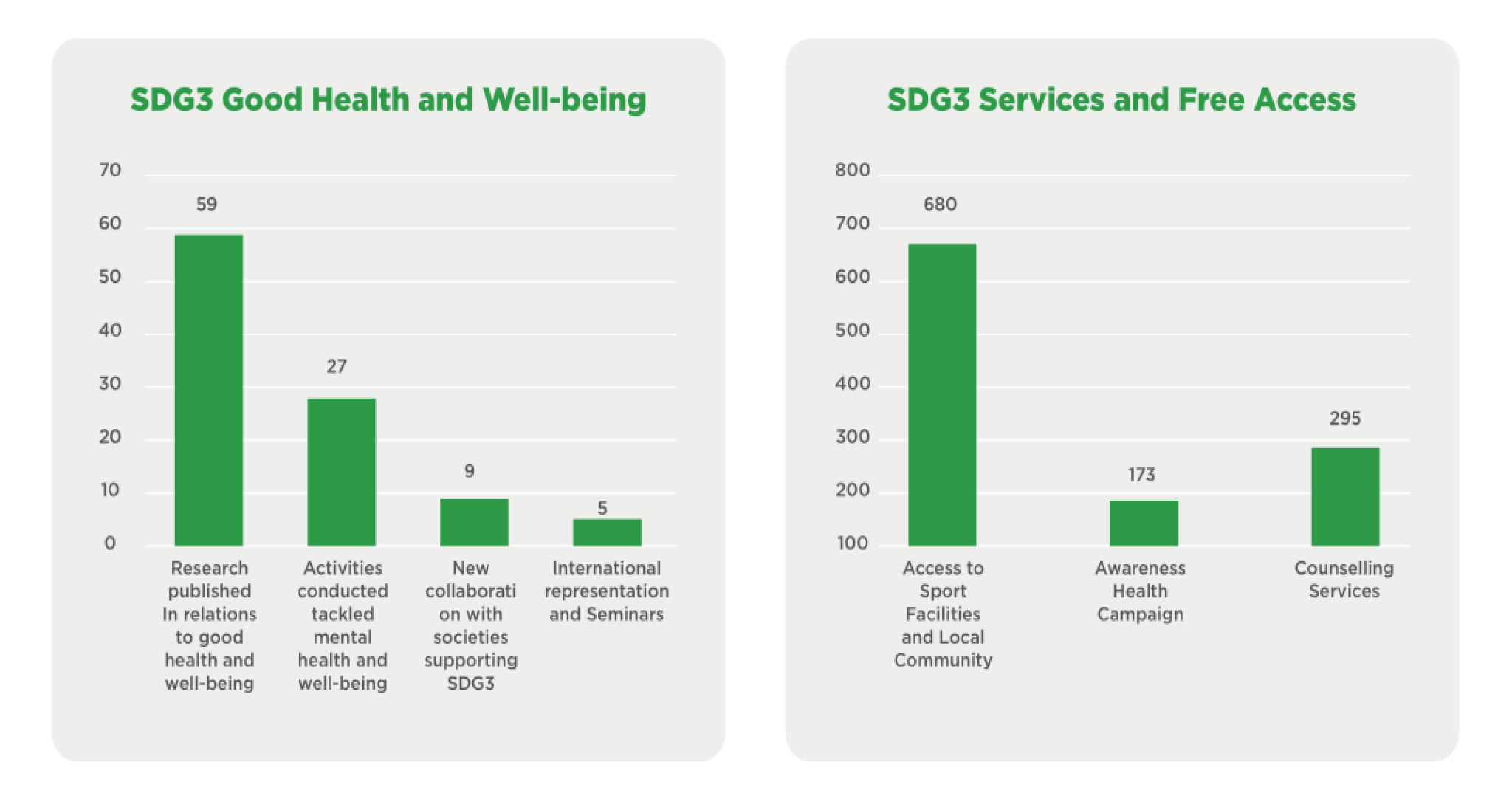
New/Revised Policies and Procedures Serving SDG3:
- Virtual Student Meetings Protocols – In order to maintain learner’s mental health, learners are provided with virtual counselling and advising meeting that are confidential. The meetings are virtual and considered formal mechanism to track learner’s progression.
- Health and Wellbeing Campaign – A campaign towards health and well-being was conducted by the health clinic at AU focusing on a weekly healthy reminder to support student, academic and support staff health and well-being.
 Quality Education
Quality Education
Overview and Highlights:
Ahlia University was ranked (2021) 14th and (2022) 23rd worldwide by Times Higher Education Impact Ranking and 1st in Kingdom of Bahrain. The academic programmes were revised in terms of Learning Outcomes and Structure to be aligned with UNSDG4 through number of courses and research topics.
AU conducted international forums tackling quality of education and proposing measures for virtual learning. AU attracted more than 28 national and international speakers from government offcials, academic experts and policy makers. The forums enable setting clear measures for UNSDGs specifically SDG4.
AU revised its graduate attributes and academic programmes to be aligned with UNSDGs by integrating new topics in specific courses contents to create a cultural mindset for the future generation. A new Teaching, Learning Excellence Policy was developed aligned with UNSDGs and focusing on life-long learning.
AU development in the area of SDG4 was selected to be presented as a case study in national and international debates and conferences. AU quality of education was measured during COVID-19 and learner satisfaction level was 81%. Conferences and Research Forums were conducted that focused on Education Quality and Management Practices that led to producing more than 3 Scopus indexed proceedings highlighting different best practices and recommendation for sustaining quality education.

New/Revised Policies and Procedures Serving SDG4:
- Teaching Excellence and Learning and Policy – AU promotes quality education and integration of lifelong learning skills, the policy aims to support development clear pedagogical framework that governs the implementation of AU teaching, learning excellence plan towards quality education.
- Annual Programme Review Procedure – A systematic detailed annual review procedure was developed that assesses the extent of improvements made to academic structure and curricular on annual basis.
- AU Assessment Manual for Online Delivered Courses – To support digital transformation from traditional learning to virtual learning, AU developed a designated Assessment Manual for virtual courses that assures appropriateness of the selected assessment methods, measurement of learning outcomes effectively and fairness of grading.
- Virtual Learning Academic Policy and Guidelines – AU promote blending virtual learning as part of teaching, learning and assessment and use of virtual learning platforms in learner’s interaction and engagement to maintain quality education.
- Revision of AU Graduate Attributes to include Adaptability and Personal Resilience, Connectivity, Engagement and Local Citizenship, Research and Ethics and Human Rights and Gender Equality.
 Gender Equality
Gender Equality
Overview and Highlights:
An annual conference tackling equal opportunities is conducted in collaboration with Brunel University London that attracts national and international speakers discussing topics related to gender equality and recommendations for policy-makers. AU added Gender Equality as part of the research niche areas with budget allocated to support faculty and learners publishing in the field of gender equality and women empowerment.
Offering a PhD (without residence) in collaboration with Brunel University London that provides the opportunity to women to progress in their career while conducting their research. AU provides sponsorship for faculty members to proceed with PhD to support women empowerment and advancement in line with Kingdom of Bahrain National Strategies.
During 2022, AU conducted the 6th Equal Opportunities Conference focusing on “sustainable leadership and technology innovation management” the conference attracted researchers from 20 countries globally and tackled research topics relevant to SDG3, SDG4, SDG5, SDG8, SDG11 and SDG17.
The conference attracted members from United Nations to present United Nations initiatives that contributes to the society. UN appreciated the level of research outcomes presented throughout the conference and highlighted the necessity of such research papers to be used towards development of policies at national level and revision of current policies.
The 6th Equal Opportunities Conference is conducted annually, the outcomes of the conference are used towards policy making at different private and government organizations to support setting standards for providing Equal Opportunities at multiple levels including level of authority and decision making.
Introduced an elective course at Undergraduate Level related to “Equal Opportunity” the course is aligned to Kingdom of Bahrain National Strategies.

New/Revised Policies and Procedures Serving SDG4:
- Admission Policy – The admission policy was revised taking into account gender equality.
- Policies to Support Women Needs – A new policy covering different support to Women Needs was established with an aim to support women progression.
- Paternity Leave – The current policy was extended above the minimum legally required as per the labour law.
- Reduction of Workload – A policy was established to reduce women workload studying PhD.
 Decent Work and Economic Growth
Decent Work and Economic Growth
Overview and Highlights:
Ahlia University promote staff progression and career growth policies and procedures were revised to support academic and professional staff career progression and growth. AU ensure that all academic and administrative staff are provided with staff development activities to support their career progression. A budget is allocated to ensure that staff are provided with continuous professional development including academic qualifications such as PhD and Postgraduate level. As part of AU strategy faculty support and progression is the main aim to retain highly qualified staff. AU faculty published 65 research papers tackling SDG8 which contributed promoting new policies and procedures towards decent growth.
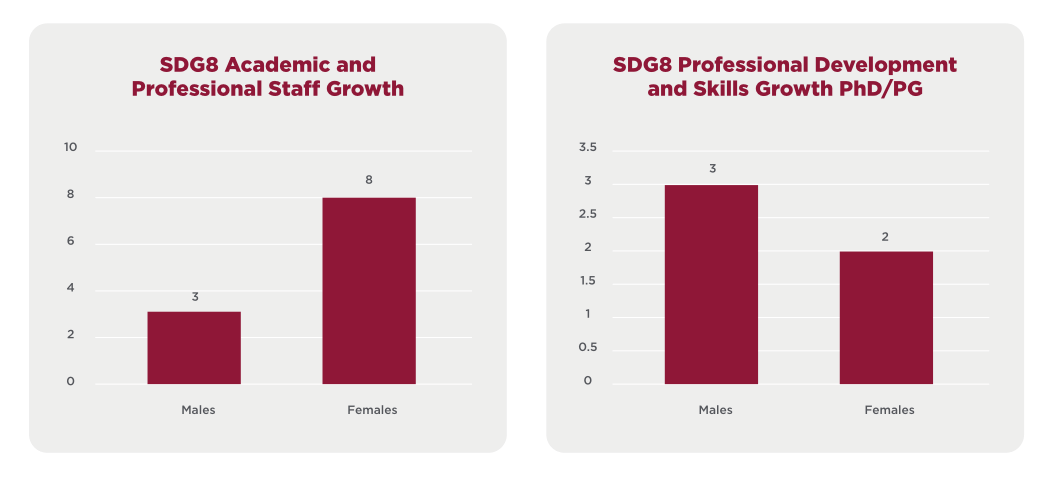
New/Revised Policies and Procedures Serving SDG4:
- The Period of Care – The period of care for female employees was extended to support female
employees. The extended period shall be deemed part of the working hours and shall not entail any wage deduction. - PhD Support and Progression – A set of policies were developed to support PhD candidates which
includes paid leave to attend (professional development activities, conferences and symposiums). - Staff Discounts for further Study – All the staff members are provided with staff discounts for proceeding with further study.
- AU Workload Policy – A detailed policy integrating academic staff workload policy covering the three core functions (teaching, research, and community engagement) was developed to support staff intellectuality and academic progression.
 Industry, Innovation and Infrastructure
Industry, Innovation and Infrastructure
Overview and Highlights:
AU attracted partnership with different industries to collaborate on a number of innovative projects to reflect an impact on the society. The academic programmes were revised to cover more practical component as per industrial expert background. Academic programmes were upgraded to cover employability skills and professional certifications.
Actively engaged the External Advisory Board to review academic programmes and evaluate its currency and relevancy. The External Advisory Board demonstrated high satisfaction level with all the academic programmes with an average on 89%. AU conducted Ahlia Youth Connect campaign which is several industrial based events to share knowledge with the student’s real-life experience in different areas.
As part of AU’s engagement with the industry, employers demonstrated a satisfaction level with AU’s graduates with an average 87% satisfaction level in terms of readiness to the market needs.
Ahlia University Learners participated in International Network based in the UK “World Technology Universities Network WUTN” and won the first prize for their innovative research in relation to the use waste recycling.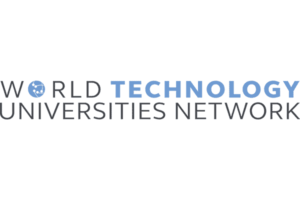
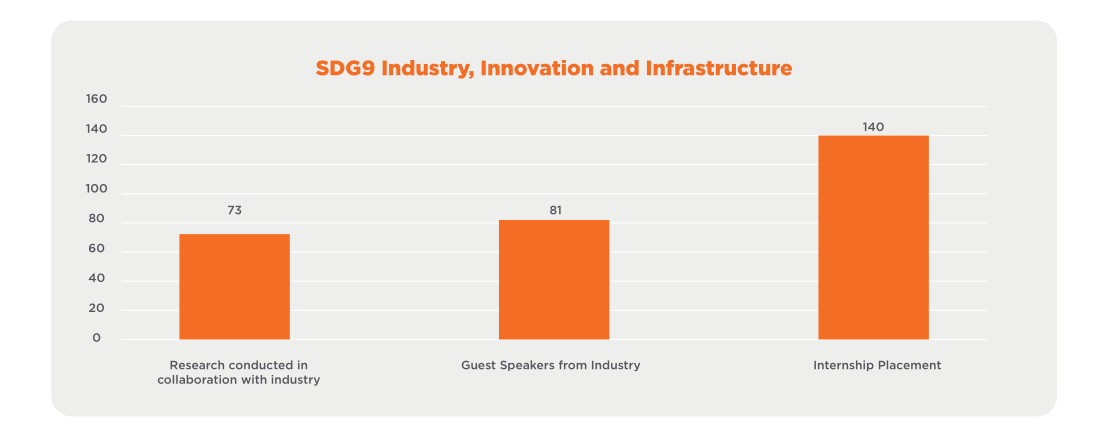
New/Revised Policies and Procedures Serving SDG4:
- Policy on Commercialisation of Research – This policy provides definitions of policy on Commercialisation of Research targeting relationship with the industry and promote innovation.
- Revised Internship Guidelines – The guidelines were revised considering subject-specific employability skills to be practiced in addition to the soft skills.
 Reduced Inequalities
Reduced Inequalities
Overview and Highlights:
AU ensures supporting learners with special needs and ensures providing support to learners to avoid any inequalities and assures equivalent learning to all learners. Since inception, AU welcomed students with special needs and maintained learner’s progression. The admission policy and procedures were revised to support learners with special needs catered with various needs to support Learners progression throughout the learning experience. AU attracted learners from various nationalities from diversified backgrounds, the learners demonstrated satisfaction with the overall experience, with non-discrimination, diversity and quality which reflected fair and transparent environment to all.
AU Signed an official agreement with the Royal Humanitarian Foundation in the Kingdom of Bahrain to automate and ease the process of providing financial aid to Orphans. During the COVID-19 crisis, the university formed a steering committee to ensure continuity of teaching and learning at Ahlia University. The university introduced a new scholarship category for frontline workers fighting COVID-19 and their dependents which is in line with Ahlia University’s core values and social responsibility.
The university established relationship with Bahrain Association for Parents and Friends of the Disabled Society to donate plastics for recycling to be replaced with assistive devices to support mobility and inclusion. A campaign was established “do not bin it donate it” has led the AU to donate 1619.7KG of plastics which is equal to two specifically designed wheelchairs for under privilege citizens in need.
As an added addition, AU established a new course “signed language” to offer as elective to all students who wish to gain the in-depth knowledge to translate through signed language.
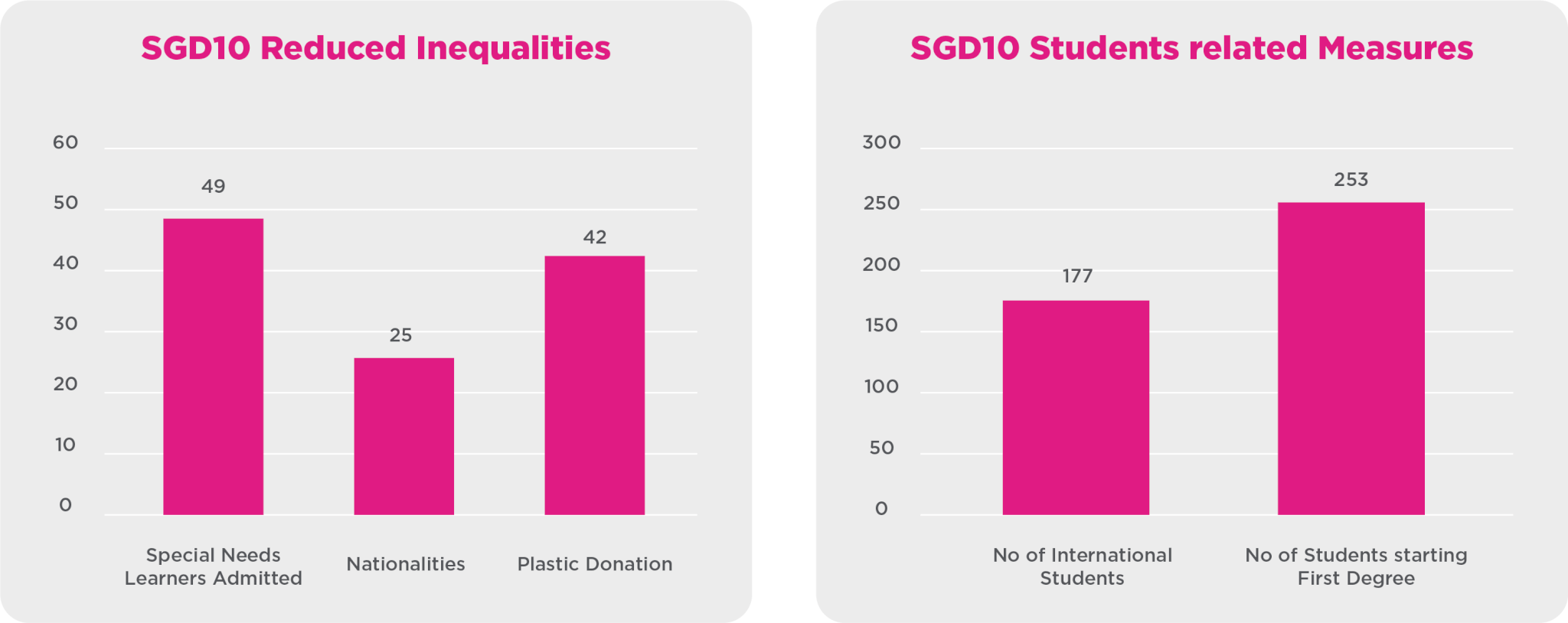
New/Revised Policies and Procedures Serving SDG4:
- Admission Policy – The admission policy was revised to be focused on inclusiveness, diversity, disability and special needs. It focused on ensuring we offer equal opportunity to all learners.
- Special Needs Discount – All learners with special receive 50% scholarship on their tuition fees.
- Admission Procedure – Revised the admission procedure and requirements to eliminate the request of medical report to avoid discrimination unless for declaration of specific student needs.
 Partnership for the Goals
Partnership for the Goals
Overview and Highlights:
Ahlia University demonstrated effective commitment towards United Nations Sustainable Development Goals (UNSDGs), the commitment was carefully aligned to AU’s Vision, Mission and Strategy and implemented though a well-sounded Sustainable Development Plan. A result of AU’s commitment, the university was ranked among 101-200 by Times Higher Education Impact Ranking 2021 and achieved 13th worldwide in SDG4 related to Quality Education and 14th worldwide related to SDG10 reduced inequalities and sustained to be amongst the leading universities in 2022, AU was ranked 23rd worldwide in SDG4 related to Quality Education and 17th worldwide related to SDG10 reduced inequalities.
As part of AU’s vision since inception the university aimed to create a capacity building and create a research hub for learners in Bahrain and the surrounded countries. The Sustainable Partnership with International Partners such as Brunel University London has led to enhance international affiliation for implementing effective and targeted capacity-building in relation to SDG4 and SDG5 through the conduct of annual conference related to equal opportunities that supports discussion of national plans and devising regulations to support sustainable development.
AU developed a teaching and learning policy that is aligned with UNSDGs, the Academic Programmes were aligned with the priority UNSDGs, the academic programmes are aligned to ensure learners connectivity, engagement, adaptability, personal resilience, gender equality and global citizenship. As an outcome of the teaching and learning policies and revision of the academic programmes research papers were published directly aligned with SDGs.
AU took the lead to create awareness and conducted several societal impact seminars by engaging relevant stakeholders that reflected improvements at multiple societal levels and built experience for new dimensions of sustainable strategies. The University Journey towards UNSDGs is annually assessed and reported, the reporting is also part of UN Commitment Platform. The following is SDG17 contribution at a glance.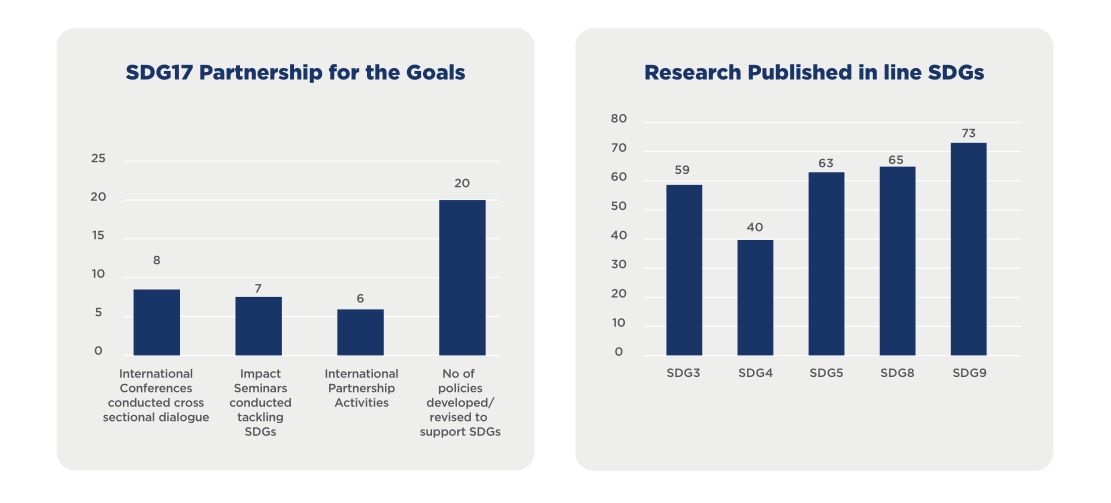
Media Coverage
Bahrain Television Coverage – Inside Edition
Prof. Abdulla Al Hawaj announced Ahlia University commitment toward United Nations Sustainable Development Goals towards sustainable future
Bahrain Television – News Highlight
News highlight that United Nations lists Ahlia University as a partner in achieving SDGs 2030
Ahlia University webinar – Higher Education Impact Measures for UNSDGs
The webinar attracted various speakers including members from United Nations, Regulators, and Quality Assurance to discuss Higher Education role in promoting UNSDGs and shared practices from different perspectives
الحواج: نجحنا في ضم 7 من أهداف التنمية المستدامة في مناهجنا التعليمية
أكد مسؤولون وأكاديميون وباحثون على أهمية مشاركة الجامعات ومختلف مؤسسات القطاع الأهلي في تحقيق أهداف التنمية المستدامة، مشددين على أهمية التعليم في معالجة العديد من القضايا والتحديات المستجدة، شريطة أن يكون تعليما جيدا ومواكبا للتطورات المتسارعة في سوق العمل.
Contact Us

Copyright 2024 © All rights Reserved. Ahlia University
